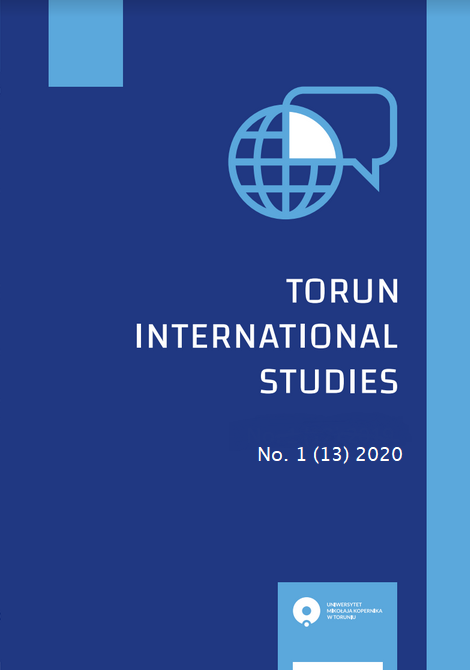HYBRID WAR AND ITS PSYCHOLOGICAL CONSEQUENCES
DOI:
https://doi.org/10.12775/TIS.2020.002Keywords
psychology, PTSD, hybrid warfare, Eastern Europe, UkraineAbstract
The article deals with war, as experienced by human beings. The authors agree that war is materially and psychosocially costly. They present experts’ opinions who professionally examined emotions and attention issues as well as dealt with the problems related to the psychological aspects of war. The main conclusion is that it is impossible to take part in a real war without experiencing strong emotions and incurring high psychological costs associated with participation in war operations. Death, injury, sexual violence, malnutrition, illness and disability are examples of the most dramatic physical consequences, and post traumatic stress disorder (PTSD), depression and anxiety are some of the effects of emotional disorders. War also contributes to disrupting the normal course of family and social life, causing suffering to people, which is very characteristic of the course of hostilities. This paper shows how people, who experienced war, respond to traumas and it presents different views on possible reactions. It also lists the consequences of psychological nature caused by hybrid warfare.
References
Andersen, S. L., & Teicher, M. H. (2008). Stress, sensitive periods and maturational events in adolescent depression. Trends in Neurosciences, 31, 183-191.
Chappelle, W., Goodman, T., Reardon, L., & Thompson, W. (2014). An analysis of post-traumatic stress symptoms in United States Air Force drone operators. Journal of Anxiety Disorders, 28, 480– 487.
French, S. E., & Jack, A.J. (2014). Dehumanizing the enemy: the intersection of neuroethics and military ethics. In D. Whetham & B.J. Strausers (Eds.), Responsibilies to Protect: Different Perspectives (pp.137-169). Leiden: Martinus Nijhoff.
Grossman, D. (1995). On Killing: The Psychological Cost of Learning to Kill in War and Society. Boston, MA: Back Bay.
Grossman, D., & Christensen, L. W. (2007). On Combat: The Psychology and Physiology of Deadly Conflict in War and in Peace, 2nd ed. Bellville, IL: PPCT Research Publications.
Guang, H.M. (2010). Collaboration during the Japanese Occupation: Issues and Problems focusing on the Chinese Community BA diss., National University of Singapore. Retrieved November 30, 2019, from https://www.academia.edu/5117582/Collaboration_during_the_Japanese_Occupation_Issues_and_Problems_focusing_on_the_Chinese_Community
Hochgesang, J., Lawyer, T., & Stevenson, T. (2014). The Psychological Effects of the Vietnam War. Stanford University.
Hoge, C. (2010). Once a warrior, always a warrior: navigating the transition from combat to home-including combat stress, PTSD, and mTB. Guilford, Conn.
James, W. (1890). The Principles of Psychology. New York: Henry Holt and Company the Principles of Psychology. doi: http://dx.doi.org/10.1037/11059-000
James, W. (1995). The moral equivalent of war. Peace and Conflict. Journal of Peace Psychology, 1 (1), 17-26.
Jayson, S. (2013, May 12). Books blast new version of psychiatry's bible, the DSM. USA Today. Retrieved November 30, 2019, from https://eu.usatoday.com/story/news/nation/2013/05/12/dsm-psychiatry-mental-disorders/2150819/
Kardiner, A. (1941). The Traumatic Neuroses of War. Physical Therapy, 21(6), 335.
Mayes, R., & Horwitz, A.V. (2005). DSM-III and the revolution in the classification of mental illness. Journal of the History of the Behavioral Sciences, 41(3), 249–67. doi: 10.1002/jhbs.20103. PMID 15981242
Moran, J. K., Crombach, A., Elbert, T., Nandi, C., Bambonyé, M., Wienbruch, C., Lommen, U., & Weierstall, R. (2017). The individual contribution of DSM 5 symptom clusters of PTSD, life events, and childhood adversity to frontal oscillatory brain asymmetry in a large sample of active combatants. Biological Psychology, 129, 305–313.
Murthy, R. S., & Lakshminarayana, R. (2006). Mental health consequences of war: a brief review of research findings. World Psychiatry, 5(1), 25–30.
Pacek, B. (2018). Wojna hybrydowa na Ukrainie. Warszawa: Rytm.
Pacek, B. (2019). Psychologia wojny hybrydowej. Warszawa: Rytm.
Pedersen, D., & Kienzler, H. (2007). Ethnic conflict. Encyclopedia of Public Health. Elsevier Science.
Scheipers, S. (2016). Winning wars without battles: hybrid warfare and other 'indirect' approaches in the history of strategic thought. Aleksanteri Papers, 1, 47-51.
Smith, T.C., Powell, T.M., Jacobson, I.G., Smith, B., Hooper, T.I, Boyko, E.J., & Gackstetter, G.D. (2014). Chronic multisymptom illness: a comparison of Iraq and Afghanistan deployers with veterans of the 1991 Gulf War. American Journal of Epidemiology, 180(12), 1176–87.
Thabet, A. A. M., Abed, Y., & Vostanis, P. (2004). Comorbidity of PTSD and depression among refugee children during war conflict. Journal of Child Psychology and Psychiatry, 45, 533-542.
Truszczyński, O. E. (2017). Wyzwania dotyczące ochrony zdrowia psychicznego ludności cywilnej w czasie konfliktów zbrojnych. In J.A. Gawęcka & J. Wojtczyna (Eds.), Współczesna obrona cywilna wyzwania ryzyko zagrożenia. Piotrków Trybunalski: Naukowe Wydawnictwo Piotrkowskie.
Turner, R.H., & Killian, L.M. (1987). Collective Behavior. Pearson Education Canada.
Downloads
Published
How to Cite
Issue
Section
Stats
Number of views and downloads: 1469
Number of citations: 0



